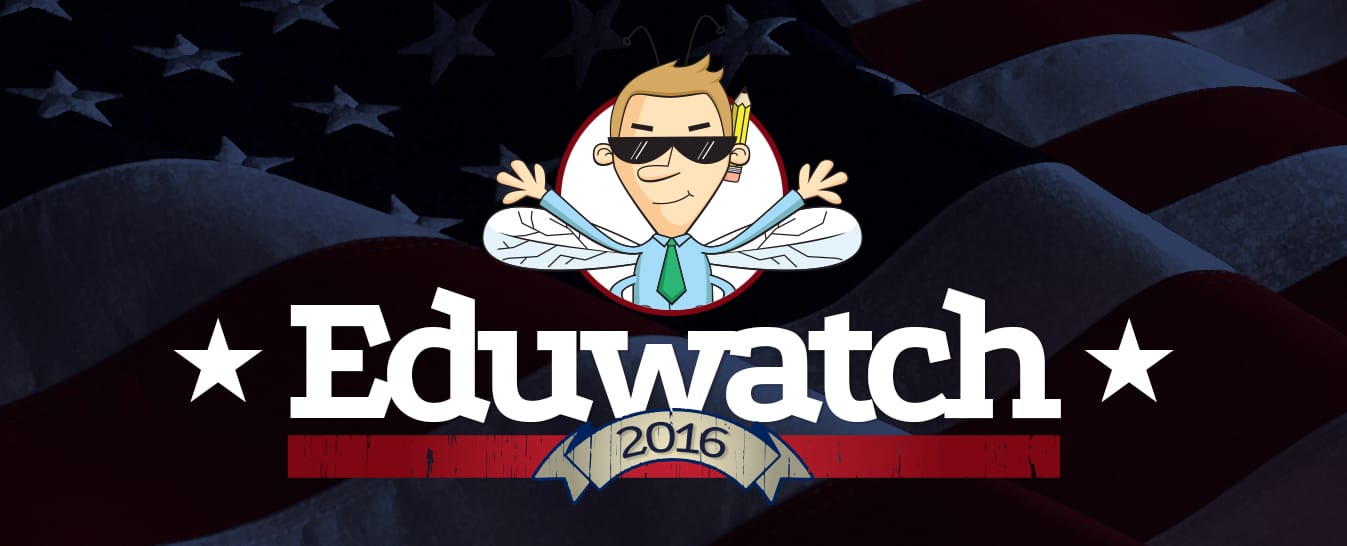
Jeb Bush announced today that he's running for president—surprising few and becoming an instant frontrunner. He's the eleventh republican to enter the race, and he’s also the subject of the ninth installment of the Eduwatch 2016 series chronicling presidential candidates’ stances on education issues.
Out of all the people who are running or may run for president, Bush is probably the most reform-minded. He was elected governor of Florida in 1999, and during his eight years in office, he focused heavily on public education—instituting, among other things, tougher standards, a voucher program, and corporate tax scholarships for low-income students. In 2008, a year after he left office, he founded the Foundation for Excellence in Education, an influential education reform nonprofit that works on standards and accountability, school choice, college and career readiness, and a number of other issues. The son and brother of former U.S. presidents has said much on education. Here is a small but hopefully representative sample:
1. Common Core as the new minimum: “In my view, the rigor of the Common Core State Standards must be the new minimum in classrooms....For those states choosing a path other than Common Core, I say this: Aim even higher, be bolder, raise standards, and ask more of our students and the system.” November 2014.
2. State control of Common Core: “Common Core means a lot of things to different people, so they could be right based on what’s in front of them. I respect people having a view, but the simple fact is we need higher standards. They need to be state-driven. The federal government should play no role in this, either in the creation of standards, content, or curriculum.” May 2015.
3. School choice: “Consumer choice created the most innovative and powerful economy in the world....Choice rewards success and weeds out stagnation, inefficiency, and failure. This is why school choice is critical to the education reform movement.” January 2014.
4. Class size: “Harvard Kennedy School researchers analyzed the impact of the class-size amendment in 2010 and found it did not improve student achievement....Reform is about creating a more efficient, more effective education system that meets the needs of children. The class-size amendment has been a hugely expensive diversion from that goal. For example, we are breaking up kindergarten classes with nineteen or twenty kids to reach some artificial threshold that has no bearing on student achievement. We have spent billions of dollars on more buildings and for more teachers with no evidence this policy produced better results.” November 2014.
5. Teacher pay: “It’s too bad we can’t use the money we are wasting on meeting arbitrary numbers and divert it to where it will do more good, such as rewarding our best teachers with the pay they deserve. Great teachers are critical to the success of children, and incentivizing them to stay on the job, or to teach in our most-challenging schools, is a reform that actually will produce results.” November 2014.
6. Preschool: “States that are considering investing in pre-K should learn the four lessons that we [Florida] did: 1) Give parents choice in preschool, both public and private; 2) ensure a focus on early literacy; 3) measure and report on the effectiveness of the programs; and 4) focus on outcomes, not inputs. With these steps, states can create programs that will show results.” November 2014.
7. The achievement gap: “NAEP results indicate that African American and Hispanic students are reading two grade levels behind their white peers. That gap is reflective of a socioeconomic divide when it comes to education, and it is intolerable on a number of levels: Morally. Socially. Economically.” November 2014.
8. Course access: “I’m very excited about the possibility of course access policies—when a state allows students the option to take courses in different learning environments from diverse, accountable providers. I envision families picking from a menu of great courses, creating individual education plans for their children. Options could include an AP Calculus course from Florida Virtual School or an online music course from Julliard. Any child in any zip code could access the best courses in the nation.” November 2014.
9. Education and technology: “The main challenge facing the country is how to redesign education around what technology allows us to do. This is not about tools as much as it is about creating new models of learning. We can personalize learning for every child in a way never before possible with blended learning. We can eliminate seat time and award credit based on mastery. We can better support teachers with new tools and resources that connect them with their peers and with experts from around the country. But these won’t work by forcing innovation to fit into old models. We need to redesign schools and classrooms to harness these opportunities.” November 2014.
10. Raising expectations in education: “Some in the education community complain that every time they achieve the results expected of them, we raise expectations, and school grades drop as a result. That was our goal. We have learned that students and teachers rise to the new challenge, and the school grades go back up because everyone rises to the challenge. This formula is how you drive success in any endeavor.” November 2014.
***
That’s it for Jeb Bush. Next up are Rick Santorum (who plans to announce on May 27), Lindsey Graham (who is set to declare on June 1), Scott Walker, and anyone else who decides to join the fray. See you then.
____________
*This post was updated on June 15 to reflect his formal annoucement of his candidacy for president. When it was originally published on May 15, it introduced him as a potential candidate.
____________
Read what Hillary Clinton, Marco Rubio, Ted Cruz, Bernie Sanders, Ben Carson, Carly Fiorina, Mike Huckabee, Rand Paul, Rick Santorum, George Pataki, Martin O'Malley, Lindsey Graham, Lincoln Chafee, and Rick Perry have said about education.

